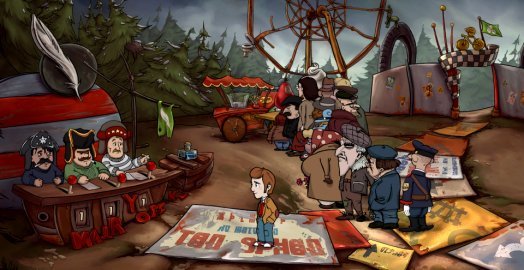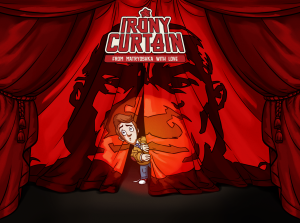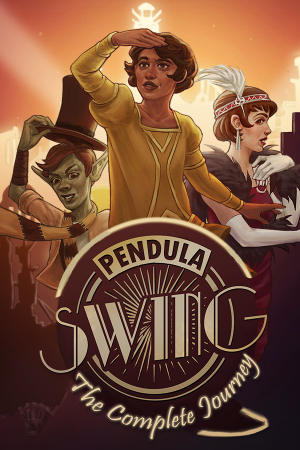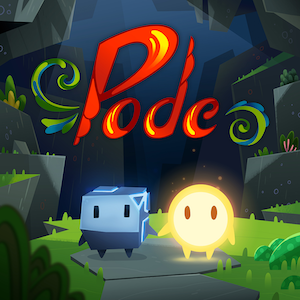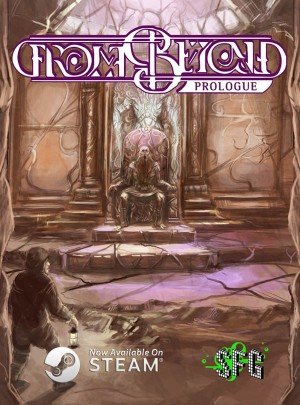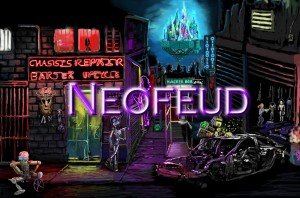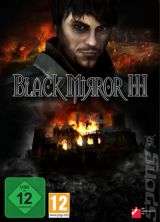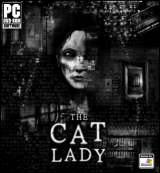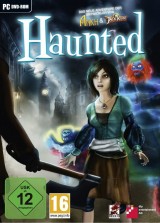Review for Irony Curtain: From Matryoshka with Love
Game information
Adventure Gamers Awards
A lot of ambitious games tend to suffer from lack of focus, whether through story or gameplay, sometimes trying to cram so much in that it just ends up cluttered and rushed. Thankfully, Artifex Mundi’s satirical Irony Curtain: From Matryoshka with Love is an exception, as it’s stuffed with content and ideas but never loses its way, resulting in a fun, hilarious, and even at times surprisingly thrilling point-and-click romp about communism, espionage and vodka.
The story follows a man named Evan Kovolsky, an American journalist advocating for socialism during the Cold War era. After trying (and failing) to give a presentation about the communist country of Matryoshka (which is assuredly not Russia) on live television, he is invited to said country by a mysterious woman named Anna, who tells him that “The Leader” wants to meet him. This being Evan’s lifelong dream, he gladly accepts, and after narrowly escaping being arrested by the FIA (the “Fringe Intelligence Agency”) for calling Matryoshka, he is soon on his way overseas to unravel a political conspiracy bigger than he could have ever imagined.
Irony Curtain touts itself as being inspired by classic adventure games, and it certainly is in its sense of humor. Some the comedy comes from the absurd situations Evan finds himself in, like having to fill out a form to use a hotel bathroom or trying to win a crate of vodka in a street gambling game – the buy-in being a bottle of the same brand of vodka.
Another source of hilarity comes from the unique characters you meet during your stay in Matryoshka. Evan himself is a likeable protagonist, especially compared to snarkier adventure game heroes. He’s goofy, well-meaning, and while initially blinded by fake propaganda (even going so far as to say his luggage being ripped apart and haphazardly sewn together is a tremendous honour), the more he experiences the real Matryoshka, the more he begins sympathizing with its citizens, ultimately to the point of helping them rise up against the government. It’s a satisfying and believable character arc that allows Evan to remain a bit flaky, while also letting him grow past his naivety and making him more relatable by mirroring the player’s reactions. The more you learn and are saddened by the rampant poverty of Matryoshka, the more Evan becomes so as well.
Evan isn’t the only kooky person throughout this journey, as there are plenty of recurring characters that populate this glorious fictional setting, including the femme fatale Anna Eaglove, who acts as the proverbial straight man to Evan and his antics; the initially imposing but eventually endearing tower of a human being Sergeant Miedviediev (who even admits he grows to like Evan over time), and the ever-mysterious Leader. He’s a short Stalin-esque dictator that basically every citizen hates yet Evan initially adores until he comes to see through the lies that have been falsely spun as the truth.
Even one-off NPCs manage to be distinctive thanks to the game’s witty dialogue. Some of my favourites were the butcher that has no meat but tons of vodka to offer, the ex-university professor who lives in a pipe, and a welding woman who just wants to be appreciated for her hard work. No matter how small the role, Irony Curtain does its best to make every interaction funny and memorable, and it usually succeeds.
The interface is extremely easy to learn, with simple controls used to move Evan around faux-3D environments. Clicking the left mouse button on objects or people brings up contextual icons like talk to, pick up, and look at. Evan can observe almost anything or anyone with something to say about it (sometimes even cluing you in on what you need). Double-clicking will make him run, but even his running speed can be a bit on the slow sider. Rolling the cursor to the top of the screen brings up your inventory, as does scrolling down on the mouse wheel. Right-clicking items in inventory allows you to examine them. This is a key part of puzzle solving, as you’ll often need to modify items before they can be used properly. Along with the ability to combine two objects together, inspecting something in close-up mode might show that it can be taken apart, adding both pieces to your inventory separately. So when you pick up a new item, always give it a once-over to see what might be done with it.
A hotspot highlighter is available via the space bar, which is helpful because every interactive object blends seamlessly into the backgrounds and some aren’t particularly obvious. Really the only things missing from this game’s user-friendly features are a fast travel map and a journal to keep track of your progress. Given how large some of the traversable areas are, the lack of map makes backtracking more tedious, and you’re on your own to remember your current objectives if you save and quit in the middle of a chapter. The latter isn’t too big a hardship, however, as while the areas are pretty open, the puzzles themselves are fairly linear, so you’re usually working on a string of minor goals to achieve the active major objective.
Your overall purpose in Matryoshka starts out being to warn the Leader of the rising rebellion, which leads to hairbrained schemes like sneaking into the palace unnoticed after incapacitating an official, and later trying to smuggle yourself in with a hillbilly who makes mushroom moonshine (or shroomcohol). Accomplishing such tasks involves standard genre fare like collecting useful items (a lot of them have more than one use), talking to people in the right order, and even navigating the occasional dialogue tree. But Irony Curtain also throws a few curveballs as well: with espionage being one of the main themes of the Cold War, there are couple times when deciphering riddles is needed. There’s no real way to die or fail overall, so don’t be afraid to take the trial and error approach, even though solutions rarely require any giant leaps in logic. The creativity of certain puzzles might stump you on occasion, but solving them can lead to triumphant “a-ha!” moments, which is the best kind of result.
Some take it a bit too far, though, and I had a tough time at two key points. The first was during an extended fetch quest spent getting things for people just so I could get more things for other people. I needed a guide for this section because it relies on a very specific sequence of events to succeed, and one environmental object is easy to miss entirely if you’re not willing to literally just stand around and do nothing for about 30 seconds. The second time was near the very end of the game at the hardest of the aforementioned riddles, which presents a whole different type of challenge than those encountered to that point. The catch is that you can only listen to the song it’s based on, not read the written lyrics, making it extra difficult. There aren’t that many riddles in the game and the earlier ones are very manageable; it’s just that one in the home stretch that ended up being a pain. The rest of the puzzles are more forgiving, so for the most part even genre newcomers should be able to pick up and enjoy this game without too many moments of exasperation.
If you do get stuck, each chapter has a character or public phone with a yellow question mark. These act as in-game guides of which you can ask certain questions about where to go next or receive a hint on how to solve the current puzzle. There’s no cost or penalty to use them so feel free to go wild, as they are extremely helpful in tight situations. The hint system is progressive, so the first may tell you what you need, and the next might tell you what to do with the item. While these can help with working through the smaller pieces of a puzzle, most hints remain subtle rather than laying everything out by serving up a full solution.
A few minigames that require quicker reflexes over logical puzzle solving are also thrown into the mix, like an approval-stamping task in which papers slide on and off a table quickly while you attempt to stamp the right ones and avoid the wrong ones (kind of like a weird version of whack-a-mole), and a drinking contest early on that is basically a version of the classic ball and three cups. I don’t want to reveal all of them, as a few are well into the journey (heck, one is at the very end), but they’re nice additions that help keep you involved in the story rather than just watching Evan do it all in cutscenes. They also make for a refreshing change when your brain might be a bit fried from some of the puzzles.
Complementing Irony Curtain’s off-the-wall narrative and gameplay is its splendid presentation, both visually and auditory. The art style consists of charming hand-painted locations and characters with clean line work that wouldn’t be out of place in a television cartoon (though more [adult swim] than Saturday morning TV for kids because of the writing). The colour palette, unsurprisingly, is comprised of reds, yellows, greys and browns, accentuating the run-down and dour atmosphere of Matryoshka. The architecture follows suit, with a lot of buildings and monuments looking worn and haphazardly cobbled together with dirty metal and broken stonework. The fabled Iron Curtain, which here is literally a huge iron wall surrounding Matryoshka, can be seen in the distance of certain backdrops and looks to be constructed from scrap metal itself. The overall tone of the aesthetic is an odd blend of whimsical and oppressive atmospheres that makes you laugh but also feel sorry for people living there. It’s unusual but works very well.
There are a good number of locations to explore, both inside and outside various Matryoshkan landmarks. Destinations range from the heart of the city to its outskirts, such as a very depressing amusement park with a Ferris wheel made of trash, and the cemetery located right next to a military base that uses a tank parked on the roof because they don’t have a proper bunker turret. These backdrops aren’t just gorgeously designed, they also have a plethora of easy-to-miss visual gags, like cardboard skyscrapers and bombs being hung from trees like forest lanterns. Character models are also eye-catching caricatures with exaggerated body shapes and proportions based on people’s personalities, so no two characters look remotely alike. You won’t be confusing the knife-handling, fridge-bodied butcher with the twiggy, bottle-glasses construction site inspector any time soon.
The backgrounds are often populated with NPCs that idle with unique animations (and are usually swarming with military personnel for further repression), making every scene feel alive. Evan himself is a fully rendered 3D model but cel shaded to blend into the 2D environments, which lets him react more expressively. Irony Curtain also treats players to the occasional animated cutscene, usually when either a chapter begins or ends. They’re a real treat, and the game has a surprising number of them, which helps boost the cinematic quality.
The audio quality is equally impressive. Most of the instrumental music instills the same oppressive mood as the graphics, with lots of heavy brass instruments and some mild strings thrown in as well. It’s very slow, reflecting how the Matryoshkan people are basically half-dead thanks to the terrible condition of their country. Contrasting the grim circumstances are plenty of bombastic sound effects that emphasize the cartoony nature of Evan’s adventure. And yet things like explosions, a train screeching to a halt, and even the occasional distant tank fire all give off a sense of dread and danger no matter where you go, as there is no escaping the Leader’s iron rule.
When you first arrive in Matryoshka, Evan isn’t able to understand some of the locals; only after receiving a Matryoshkan dictionary is he able to discern the language. Once he does the game has extensive voice acting, some with Russian accents but others ranging wildly from southern drawls, different Eastern European accents, and even some military personnel that sound like they’re from the US army. Christopher Ragland does an excellent job portraying Evan's silly naivety while also sounding like a know-it-all journalist. But all the actors do a very good job of conveying proper emotions, with none of the performances feeling flat at any point. That’s quite a feat for such a large cast, even if multiple characters have been voiced by the same actors.
On the technical side, the game doesn’t offer much other than a few basic settings, but it isn’t demanding to run, and I didn’t run into any problems during my entire eight-hour run.
In the end, Irony Curtain: From Matryoshka with Love is a wonderful point-and-click adventure that simultaneously feels very nostalgic and yet very much a modern evolution of the genre classics that inspired it. While there are a couple frustrating moments, the journey is filled with fantastic art, lovable characters, varied gameplay, and loads of fun gags, all wrapped up nicely in a story about being the change you want to see. This game comes highly recommended for those looking to have a good laugh and enjoy a very polished adventure at the same time.




